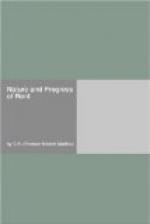On the other hand, it will appear, that a fall of rents is as necessarily connected with the throwing of inferior land out of cultivation, and the continued deterioration of the land of a superior quality; and that it is the natural and necessary consequence of causes, which are the certain indications of poverty and decline, namely, diminished capital, diminished population, a bad system of cultivation, and the low price of raw produce.
If it be true, that cultivation cannot be extended but under such a state of prices, compared with the expenses of production, as will allow of an increase of rents, it follows naturally that under such a state of relative prices as will occasion a fall of rents, cultivation must decline. If the instruments of production become dearer, compared with the price of produce, it is a certain sign that they are relatively scarce; and in all those cases where a large quantity of them is required, as in the cultivation of poor land, the means of procuring them will be deficient, and the land will be thrown out of employment.
It appeared, that in the progress of cultivation and of increasing rents, it was not necessary that all the instruments of production should fall in price at the same time; and that the difference between the price of produce and the expense of cultivation might increase, although either the profits of stock or the wages of labour might be higher, instead of lower.
In the same manner, when the produce of a country is declining, and rents are falling, it is not necessary that all the instruments of production should be dearer. In a declining or stationary country, one most important instrument of production is always cheap, namely, labour; but this cheapness of labour does not counterbalance the disadvantages arising from the dearness of capital; a bad system of culture; and, above all, a fall in the price of raw produce, greater than in the price of the other branches of expenditure, which, in addition to labour, are necessary to cultivation.
It has appeared also, that in the progress of cultivation and of increasing rents, rent, though greater in positive amount, bears a less, and lesser proportion to the quantity of capital employed upon the land, and the quantity of produce derived from it. According to the same principle, when produce diminishes and rents fall, though the amount of rent will always be less, the proportion which it bears to capital and produce will always be greater. And, as in the former case, the diminished proportion of rent was owing to the necessity of yearly taking fresh land of an inferior quality into cultivation, and proceeding in the improvement of old land, when it would return only the common profits of stock, with little or no rent; so, in the latter case, the high proportion of rent is owing to the impossibility of obtaining produce, whenever a great expenditure is required, and the necessity of employing the reduced capital of the country, in the exclusive cultivation of its richest lands.




